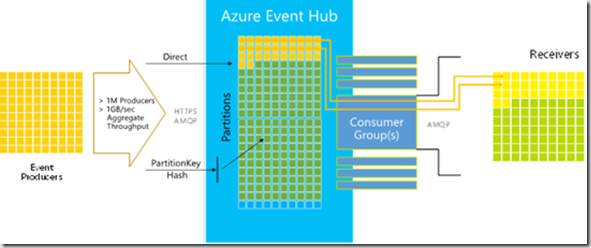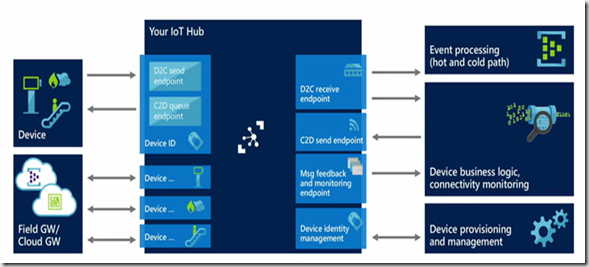Imagine that you are the CEO of a big Logistic & Transport Company that works across the UK. In order to obtain multiple insights that will allow you to efficiently analyse how your company is performing and help you take better decisions, you decide to start collecting different telemetry information from the vehicles fleet. The question is, how will you manage to deal with hundreds of connected devices producing millions of telemetry data? The answer is….
Event Hubs
Back in 2014, Microsoft announced the release of Azure Event Hubs, a service that allows the collection of high throughput ingress of data streams generated by devices and services in an easy, secure and reliable way.
The Event Hubs can be created either through the Azure Portal or the Management API and gets immediately available without the need of further setups or management/maintenance requirements. The information stored in customer partitions will provide the message streaming. Each customer will only read a specific subset of the message stream due to the portioned customer pattern.
IoT Hub
In a very simplistic way, the Azure IoT Hub is the bridge between our devices and the cloud. It is fully manageable, enables reliable and secure device-to-cloud and cloud-to-device communication between millions of IoT devices and provides a service interface to support the application development.
Event Hubs or IoT Hub
If we consider the IoT Hub as an improvement of Event Hubs, shall we assume that the solution to the scenario described on the top of the article will be the first option? The answer is… depends on what we want to achieve.
If our needs require bidirectional communication and millions of simultaneously connected devices, IoT Hub would be the choice, however, combining the IoT Hub and Event Hubs instead of using them separately is a better option. While IoT Hub can deal with the device-to-cloud communication, the Event Hubs can deal with the huge amount of event ingresses produced by our vehicle fleet.
More Info:
https://azure.microsoft.com/en-us/blog/announcing-azure-event-hubs-general-availability/
https://docs.microsoft.com/en-gb/azure/event-hubs/event-hubs-overview
https://azure.microsoft.com/en-gb/documentation/learning-paths/iot-hub/
https://azure.microsoft.com/en-gb/resources/videos/azurecon-2015-overview-of-azure-iot-hub/
http://www.jamesserra.com/archive/2017/02/iot-hub-vs-event-hub/



Introduction to Data Wrangler in Microsoft Fabric
What is Data Wrangler? A key selling point of Microsoft Fabric is the Data Science
Jul
Autogen Power BI Model in Tabular Editor
In the realm of business intelligence, Power BI has emerged as a powerful tool for
Jul
Microsoft Healthcare Accelerator for Fabric
Microsoft released the Healthcare Data Solutions in Microsoft Fabric in Q1 2024. It was introduced
Jul
Unlock the Power of Colour: Make Your Power BI Reports Pop
Colour is a powerful visual tool that can enhance the appeal and readability of your
Jul
Python vs. PySpark: Navigating Data Analytics in Databricks – Part 2
Part 2: Exploring Advanced Functionalities in Databricks Welcome back to our Databricks journey! In this
May
GPT-4 with Vision vs Custom Vision in Anomaly Detection
Businesses today are generating data at an unprecedented rate. Automated processing of data is essential
May
Exploring DALL·E Capabilities
What is DALL·E? DALL·E is text-to-image generation system developed by OpenAI using deep learning methodologies.
May
Using Copilot Studio to Develop a HR Policy Bot
The next addition to Microsoft’s generative AI and large language model tools is Microsoft Copilot
Apr